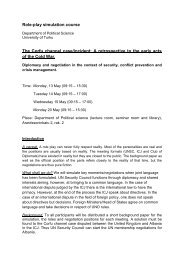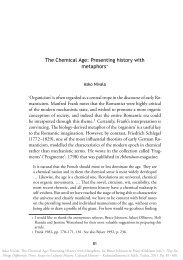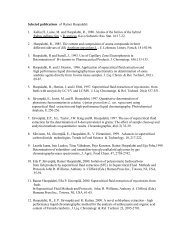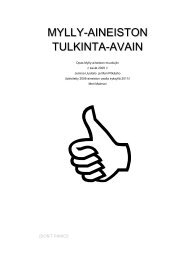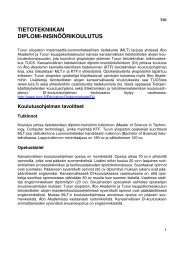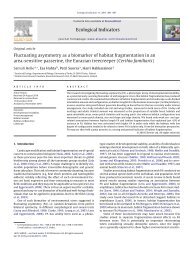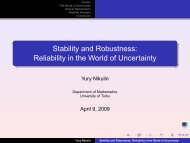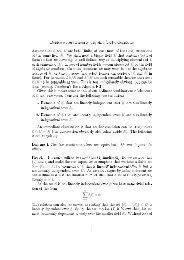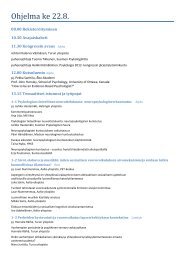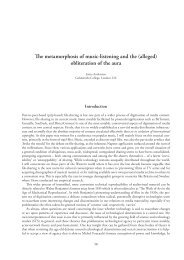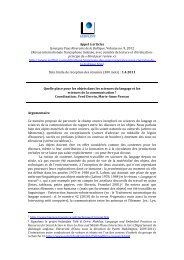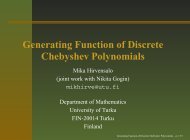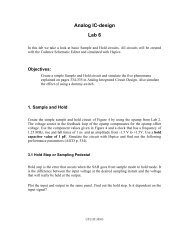The Chemical Age: Presenting history with metaphors∗
The Chemical Age: Presenting history with metaphors∗
The Chemical Age: Presenting history with metaphors∗
Create successful ePaper yourself
Turn your PDF publications into a flip-book with our unique Google optimized e-Paper software.
<strong>The</strong> <strong>Chemical</strong> <strong>Age</strong>crowds paid little attention at the time has played a larger role than anyactivity of the crowd itself. 65In the fragment, Schlegel claimed that the cultural impact of Fichte’sScience of Knowledge (Grundlage der gesammten Wissenschaftslehre, 1794)and Goethe’s Wilhelm Meister’s Apprenticeship (Wilhelm Meisters Lehrjahre,1795–6) were parallel to the French Revolution. When he was defendinghimself against the political accusations, Schlegel indirectly articulatedhis writing strategy at the same time. I argue that this strategy providesvaluable reading instructions for the current readers:I wrote this fragment <strong>with</strong> the most honorable intentions and almost entirely<strong>with</strong>out irony. <strong>The</strong> manner in which it has been misunderstood has surprisedme beyond words because I had expected misunderstanding from an entirelydifferent quarter. That I consider art to be the core of mankind and theFrench Revolution an excellent allegory for the system of transcendentalidealism merely happens to be one of my most subjective views. But I haveindicated this so frequently and in so many different ways that I might havehoped that the reader would finally have grown accustomed to it. <strong>The</strong> restis merely a language of ciphers. … So far there has not been any irony andthere should not have been any misunderstanding; and yet this fragmenthas been so misunderstood that a well-known Jacobin, Magister Dyk inLeipzig, even thought he found democratic sentiments in it. 66<strong>The</strong>re is evidence here to support my argument that there were politicalreasons for the Romantics’ use of abstruse and esoteric metaphoricallanguage. Schlegel referred to Johann Dyk (1750–1813), who was abookseller from Leipzig. <strong>The</strong> mention of Dyk emphasized the role ofbookstores as disseminators of revolutionary ideas that were included infragment no. 216 as a cipher code.In the essay ‘On Incomprehensibility’, Schlegel hinted that the variousmetaphors in his fragments are a language of ciphers. In addition tomentioning irony, he refers to the language of his fragments as ‘code’.Earlier in his essay, Schlegel even compares his metaphorical expressions<strong>with</strong> the secret societies hiding inside language:65 (Translation modified; my emphasis.) Schlegel [1800] 1997, p. 121; KFSA II, p. 366.Cf. KFSA II, pp. 198–199. No. 216.66 (Translation modified; my ellipsis.) Schlegel [1800] 1997, pp. 121–122; KFSA II, p.366.Asko Nivala: <strong>The</strong> <strong>Chemical</strong> <strong>Age</strong>: <strong>Presenting</strong> History <strong>with</strong> Metaphors. In: Bruce Johnson & Harri Kiiskinen (eds.): <strong>The</strong>y DoThings Differently <strong>The</strong>re. Essays on Cultural History. Cultural History – Kulttuurihistoria 9. k&h, Turku, 2011. Pp. 81–108.99




